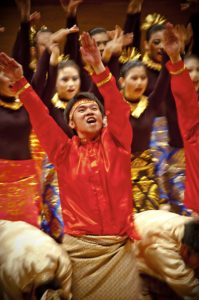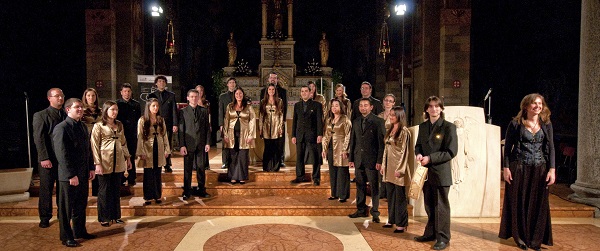Three Weeks of Choral Music in Lombardy, Italy
by Andrea Angelini, ICB Managing Editor
For the last 20 years, June has been a special month for choral music in Lombardy, the Italian region which runs from the Po River to the Alps and the Swiss border of Italy.
During this month, some of world’s most accomplished choirs visit Lombardy and perform throughout the region, singing at many different locations from the largest towns to small Alpine villages.
This is the International Choir Festival ‘La Fabbrica del Canto’, which has taken place annually since 1992 in Legnano, a small town in the province of Milan, and throughout the region. The festival visits towns that have a rich cultural heritage, such as Bergamo, Brescia and Pavia, the flat landscape of the Po Valley and the high peaks of the Alps. The event is organised by Legano’s Jubilate Music Association.
The birth of a tradition.
In 1975 a group of friends formed the ‘Jubilate Choir’ in Legnano, with the aim of studying and promoting choral music. Over the years the choir gradually refined its technical and performance skills and tested its progress by competing against important choral groups in competitions and festivals, both nationally and internationally.
These events afforded the choir’s singers the opportunity to share their love of choral music with a much larger public, and they began actively promoting this little known musical genre across the region. This is how the first year of the Festival came to be organised, in 1992, by the Jubilate Choir singers.
The festival was initially dubbed the ‘International Choir Festival Città di Legnano’, in order to highlight both its ties with Legnano, the home of the Jubilate Choir and the main source of funding for the inception of the event, and to stress the international picture that the festival wanted to represent. Moreover, its classification as a festival underlined the non-competitive aspect, during a time in which choral competitions were the main forum in which the world’s finest choirs could be heard.
In 1997, it was renamed the International Choir Festival ‘La Fabbrica del Canto’ as a new project was launched. The aim of this project was the creation of a concert circuit in which guest choirs could perform, not just in Legnano but also in nearby towns. Permission to proceed with the project was granted by the Head Office and the Director of Culture of the Province of Milan and the Lombardy Regional Government. These bodies permitted Legnano Council, which already supported the festival, to sponsor the new extended initiative.
The aim of this concert circuit was to transform the festival into a large-scale event, spread over an area that was quite culturally poor, which would reach an increasingly larger audience as it spread across the region.
The festival’s new name, International Choir Festival ‘La Fabbrica del Canto’, (which is roughly translated as ‘The Song Factory’), detaches it from any binding territorial references and more effectively communicates the nature of the event. The term “Factory” not only reflects the creativity and commitment that are intrinsically linked to any form of art, but also amalgamates tradition and modernity as it harks back to past environments such as laboratory, atelier and workshop. This adds a social dimension which is both contemporary and familiar to the local population, hence the territorial reference is subtly maintained whilst a trait that is peculiar to choral singing is underlined – the birth of contemporary art forms out of a century-long tradition.
Since its inception, and across 20 years of the festival, La Fabbrica del Canto has grown from 4 to 21 days in length, from 4 to 8 choirs performing at each festival, from 4 to 62 concerts, from 1 to 85 venues across the region, and an increased geographic scope with a population of 2,400,000 (from 54,000 at its inception).
The festival has proved enormously popular with the public, and the number of attendees has increased from 3,000 in 1992 to 25,000 in 2011. This has spurred on the organiser, Legano’s Jubilate Music Association (established in 1994 by Coro Jubilate), to increase the size of the event year after year.
A unique mix
The event formula is unique on the choral music scene. Firstly, the selection of the wide variety of choirs performing at the festival aims to cover as many types of choral music as possible, demonstrating a variety of sounds, colours, modes of expression, and artistic interpretation and a wide repertoire. The second unique aspect is the format of the festival, as it consists of thematic concerts performed by all choirs, in which each participating choir is asked to sing a short program of sacred or secular music. This allows the public to experience a wide variety of cultures, styles and sounds in a single concert. After this initial taster, all the choirs perform solo concerts for about a week in a number of towns, thus giving the audience a chance to see a single choir in full and hear its full repertoire.
Since 2009 the formula has been altered slightly: there are now two halves, each with 4 choirs invited, and a very large event over the mid weekend, in which all 8 choirs sing in two marathons, one of sacred and the other of secular music. These take place in two very prestigious locations in the centre of Milan: sacred music in Sant’Ambrogio Basilica and secular music in the Dal Verme Theatre,, near the Sforzesco Castle and the Cathedral.
The 2011 festival
The 20th International Choir Festival ‘La Fabbrica del Canto’ took place from 3 to 21 June.
The Jubilate Music Association invited the following choirs to attend the first half of the festival: The Gents (male – The Netherlands – Cond. Bèni Csillag), Estudio Coral Meridies (mixed – Argentina – Cond. Virginia Bono), Pro Musica Girl’s Choir (female – Hungary – Cond. Dènes Szabò) and Parahyangan Catholic University Choir (mixed – Indonesia – Cond. Paulus H. Yoedianto). For the second half of the festival, the Association invited Hover (mixed – Armenia – Cond. Sona Hovhannisyan), The Joyful Company of Singers (mixed – UK – Cond. Peter Broadbent), Arctic Lights (female – Sweden – Cond. Susanna Lindmark) and Realtime (male quartet – Canada).

The first half opened with two concerts in Legnano (on 3 and 4 June), in which all 4 choirs sang; the first covered sacred music and the second secular music. The choirs then performed individual concerts every evening in different towns across the region.
On the weekend of 11/12 June, the remaining 4 choirs joined the event and leant their voices to the two marathons, in which all 8 choirs performed a short program. The Dal Verme marathon was recorded and will soon be available on DVD, like the 2010 edition, which is already available.
In the second half, the second 4 choirs performed individual concerts throughout the following week, except for June, 17 in which a joint concert of contemporary music was given in Legnano.
Supporting a good cause
The Jubilate Music Association was very keen to support the ‘Sing for Japan’ initiative which was established by Maestro Ko Matsushita, whom we proudly featured in two different years of ‘La Fabbrica del Canto’, in support of the Japanese population so terribly hit by the earthquake and the tsunami.
Therefore, during both marathons all 8 featured choirs plus the Jubilate Choir performed Cantate Domino by Ko Matsushita in support of the initiative. The choirs (260 singers) were conducted by Jubilate Choir conductor, Paolo Alli.
Fact and figures
To better describe the whole event, here are some numbers that should give you an idea of the scope of the 2011 Festival.
During the 20th ‘La Fabbrica del Canto’ festival the 8 invited choirs performed 251 different pieces by 135 composers.
The 48 concerts, spread over 21 days, took place in 39 municipalities to a total audience of around 25,000. The two choral marathons in Milan drew the largest audiences – an attendance of about 3,500 people.
The towns involved cover a combined catchment area of 2,400,000 citizens, in 9 of the 13 provinces in Lombardy.
E-mail: aangelini@ifcm.net
Edited by Laura Clarke, UK

